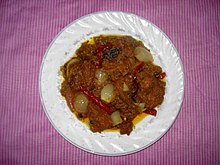Dopiaza
This article needs additional citations for verification. (August 2019) |
 | |
| Course | Main course |
|---|---|
| Main ingredients | Meat, onions, curry |

Dopiaza (meaning "two onions") is the name of an onion-based dish. It is prepared with many onions,[a] both cooked in the spices and curry[2] and as a garnish. Onions are added at two stages during cooking, hence the name. The dish usually contains a meat, usually beef, chicken, lamb,[2] mutton, or shrimp; however, it can also be prepared in a vegetarian style.
History
According to the legend the dish was created when a courtier of Mughal emperor Akbar Mullah Do Piaza accidentally added a large quantity of onions to a dish. The dish evolved further in Hyderabad, India, Pakistan, and many other countries around the world and became a staple of Mughal cuisine.
Ingredients
As many other Hyderabadi dishes, the addition of a sour agent is a key part of dopiaza. Most often, raw mangoes are used; however, lemon juice or cranberries can be used as well. Basic ingredients for dopiaza are chicken or other meats, onions, ginger and garlic paste, whole hot spices (black cardamoms, cloves and peppercorns), salt and chili powder.
Iranian Dopiaza may be prepared using potatoes, onion, turmeric powder, tomato paste, dried fenugreek leaves, and spices.
See also
Notes
References
- ^ Time-Life Books (1988). Fresh ways with pork. Healthy home cooking. Time-Life Books. ISBN 978-0-8094-6033-5. Retrieved 22 August 2019.
- ^ a b Basu, Mallika (16 December 2015). "Lamb Dopiaza: an alternative recipe for Christmas Day". Evening Standard. Retrieved 22 August 2019.
